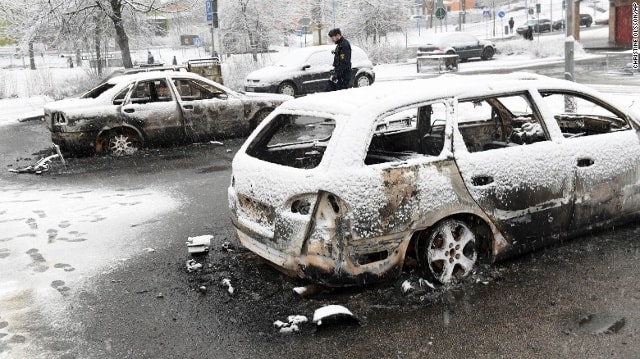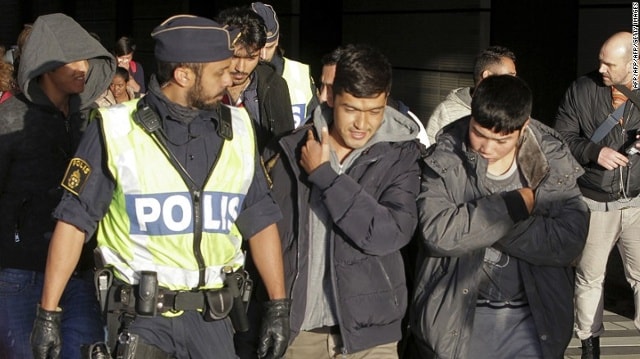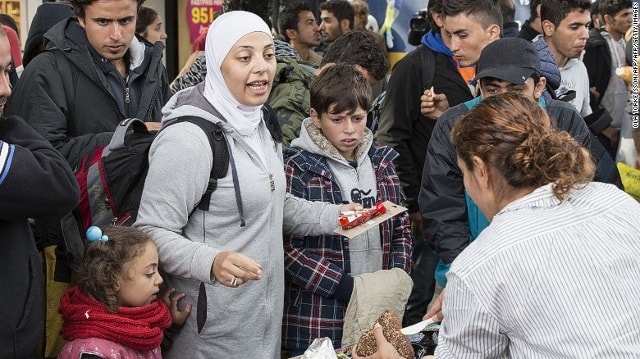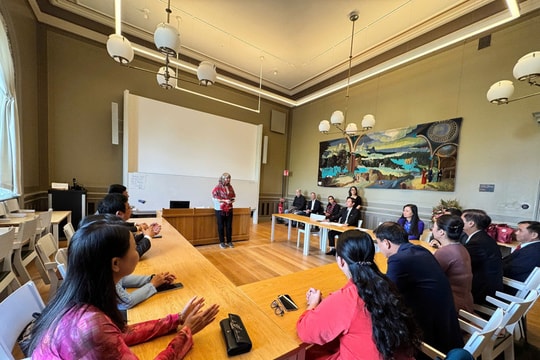Immigrants: Pressure tames Swedish pride
(Baonghean) - Currently, many Swedes still have a skeptical attitude. Some Rinkeby residents believe that the government has not done enough to solve the problems arising from the large number of immigrants.
At first glance, Rinkeby looks like many other places in Sweden: because of the moderately tall buildings with elegant paint colors, the airy square, the rows of trees running along the streets...
And on closer inspection, one will see Arabic signs in windows, hear conversations in Kurdish and see many faces of Somali descent. Yet Rinkeby remains a place of many inadequacies.
 |
| Riots broke out in a Stockholm suburb earlier this week. Photo: CNN. |
After Donald Trump said on February 20 that something was wrong in Sweden - a country long known for its welcoming policies towards migrants and refugees - the US President's comments were met with mixed opinions, even ridicule.
However, when riots broke out in Rinkeby just days later, not far from central Stockholm, a local resident whose parents immigrated to Sweden from Greece exclaimed: “Everything Trump said is true,” and commented that immigration to Sweden is now out of control, with so many people coming in and limited space, not to mention migrants “freely” doing whatever they want. However, the majority still believe that Sweden’s immigration policy is a source of pride for them.
Newcomers
What Trump was certainly right about Sweden and migrants was his claim at an event in Florida last weekend that the country has taken in large numbers of migrants. Statistically, Sweden has a higher per capita migration rate than any other European country.
At the height of Europe’s migrant crisis in 2015, more than 160,000 people arrived in Sweden seeking asylum – a staggering number for a country of less than 10 million people. “If the US wanted to be comparable, it would have to take in 6-7 million migrants,” says Magnus Ranstorp, a counter-terrorism expert at the Swedish National Defense University.
With so many newcomers, it is perhaps no surprise that problems have arisen. Integration, and lack of integration, has become a real concern, especially in major cities such as Stockholm, Malmö and Gothenburg. Returning to Gothenburg after 10 years away, half-Swedish and half-Bolivian citizen Josefin Larsson commented on the gap between past and present.
When her mother’s family moved here 20 years ago, they found it easy to integrate into the community. The government spent time helping them learn the language, find jobs, and learn about the culture. There were even programs in place to make them feel welcome in their new land.
“Things are different now, in the cities there are almost no Swedes anymore. Instead there are people from different countries, there are many beggars on the streets, and the government cannot take care of everyone,” Larsson said.
In an effort to promote ties between Swedes and immigrants, community groups and organizations in a number of Swedish towns and cities are paying close attention to these issues.
Kompis Sverige is one such service, introducing “new Swedes” to long-time residents, in an attempt to build friendships and prevent xenophobia.
Or the organization Invitationsdepartementet aims to connect people who are fluent in Swedish and new immigrants who want to improve their language skills, eat home-cooked meals together, come closer together, and use warm hearts to push back xenophobia and boycotts.
 |
| Newly arrived migrants disembark from a ship near Malmo, Sweden, at the height of the European migration crisis in 2015. Photo: CNN. |
Integration or skepticism?
Many Swedes remain skeptical. Some Rinkeby residents believe that the government is not doing enough to address the problems caused by the large influx of immigrants. Some even suspect that instead of taking action, the government is ignoring the situation, and as a result, things will get further out of control.
Larsson also shared that although people think Sweden is a safe place, gang violence and security threats make her feel uneasy every time she goes out. This worry is not without basis, if you look at the attacks caused by suspected migrants. For example, in January 2016, a 22-year-old woman was murdered at the asylum center where she worked, putting pressure on the government to limit immigration numbers.
But the police deny any link between immigration and crime in low-income areas like Rinkeby. “I don’t deny that there are integration problems,” says Varg Gyllander of the Stockholm Police Department. “It’s wrong to equate immigration, crime and terrorism, because they are not closely linked, the reality is much more complicated.”
 |
| Volunteers hand out food and water to migrants arriving at Malmo station in September 2015. Photo: CNN. |
The rise of the far right
Many Swedish law enforcement experts believe that the country is struggling with anti-immigrant extremists. “One of our biggest problems is right-wing extremism,” said Ranstorp. “There have been far-right groups that have buried explosives right next to refugee centers.”
From officials to the country’s leaders, Sweden has publicly criticized the US President for declaring that the country is “facing problems it never thought it would.” Even Swedish Prime Minister Stevan Löfven has spoken out, declaring that everyone has a responsibility to provide accurate information and verify any information they intend to disseminate.
However, some political groups here still show a positive attitude towards Mr. Trump's comments. Many members of the far-right are grateful that President Trump dares to "point out the problem frankly." For them, Sweden is in trouble, or worse, is facing a crisis with serious problems related to law and order. This group believes that if the border is not strictly controlled, if the immigration issue is handled irresponsibly, the consequences will obviously be unavoidable.
And so, Mr. Trump's "gaffe" is not entirely meaningless, and perhaps the country that has always prided itself on having the most open immigration policy on the old continent will have to consider the most reasonable solution to ease the signs of escalating tension.
Thu Giang
(According to CNN)








